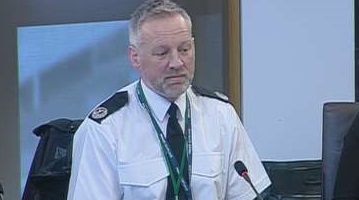Mental health and missing person issues impact heavily on police time and resources, MSPs told
Officers have been told they are doing a very good job as the burden of non-criminal work places ever-increasing demands on police time and resources.
Officers have been told they are doing a very good job as the burden of non-criminal work places ever-increasing demands on police time and resources. Doctors and health bodies have heaped praise on Police Scotland in its provision of a service of first to last resort. Four out of five incidents attended do not involve a crime, MSPs were told on Tuesday (January 24). Assistant Chief Constable Malcolm Graham said out of more than 900,000 incidents last year, only about one in five resulted in a crime being recorded with mounting pressure coming from mental health issues and missing persons. Domestic abuse still takes up the most time, he added. In a written submission to Holyrood`s Justice Committee, he said officers went to more than 42,000 incidents in 2014/15 involving mental health or distress. A study in West Lothian found they spend, on average, four hours and 20 minutes dealing with a single incident relating to mental health, self-harm or attempted suicide. And he highlighted recent research indicating the cost for managing missing-person inquiries in Scotland each year could reach £80 million, equivalent to five per cent of the annual policing budget. He wrote: “We know that the demands on our services are changing and that public requirements of policing in Scotland are more complex than just responding to, and preventing, crime. “While I recognise the often devastating impact that crime has on individuals and communities, the impact of non-criminal incidents is just as evident. “Many of the most time-consuming incidents relate to concerns for persons, missing/absconded persons and dealing with sudden deaths. “These calls are often linked to vulnerability and people in crisis; recorded crime alone is therefore not an accurate measure of demand on policing services”. He said the force had some successful pilot projects with other organisations to reduce demand on police time and better address the issues involved. Doctors organisation British Medical Association Scotland also submitted written evidence to the committee, saying health bodies regularly collaborate with police in cases of people with dementia, those suffering from acute psychotic symptoms, mental health difficulties and personality disorders, as well as those intoxicated with drugs or alcohol. Consultant psychiatrist Dr Peter Bennie, from the BMA, said: The general experience of doctors is that the police are doing a very good job.” And the BMA submission statement added that the efforts of the officers was achieved in difficult circumstances often feeling, quite realistically, that they are dealing with things outwith their remit. The association warned that any major changes to the current situation would need “major investment in health and social care services”. Alzheimer Scotland told the committee it is delighted to have worked with police across Scotland as partners on several Dementia Friendly Community initiatives to help sufferers to continue to live as independently as possible. The committee, which was examining the demands of non-criminal incidents on police time, and how public bodies and voluntary organisations can work together with the police to ease some of the pressure on officers, also heard representations from the Bethany Christian Trust, the Scottish Drugs Forum, Social Work Scotland as well as the Scottish Police Federation (SPF). SPF general secretary Calum Steele told the committee hearing on Tuesday that the services are carrying the risks of many vulnerable people and the lack of finance invariably leads to pressure on the people. He warned the lack of finance impacting on the support services could lead to a breaking point and many vulnerable people being failed by the mythical system. Mr Graham replied that working in partnership would be necessary regardless of austerity. Committee convener Margaret Mitchell said: “Police time is a precious resource and their role in keeping people safe is vitally important. “However, it has t


